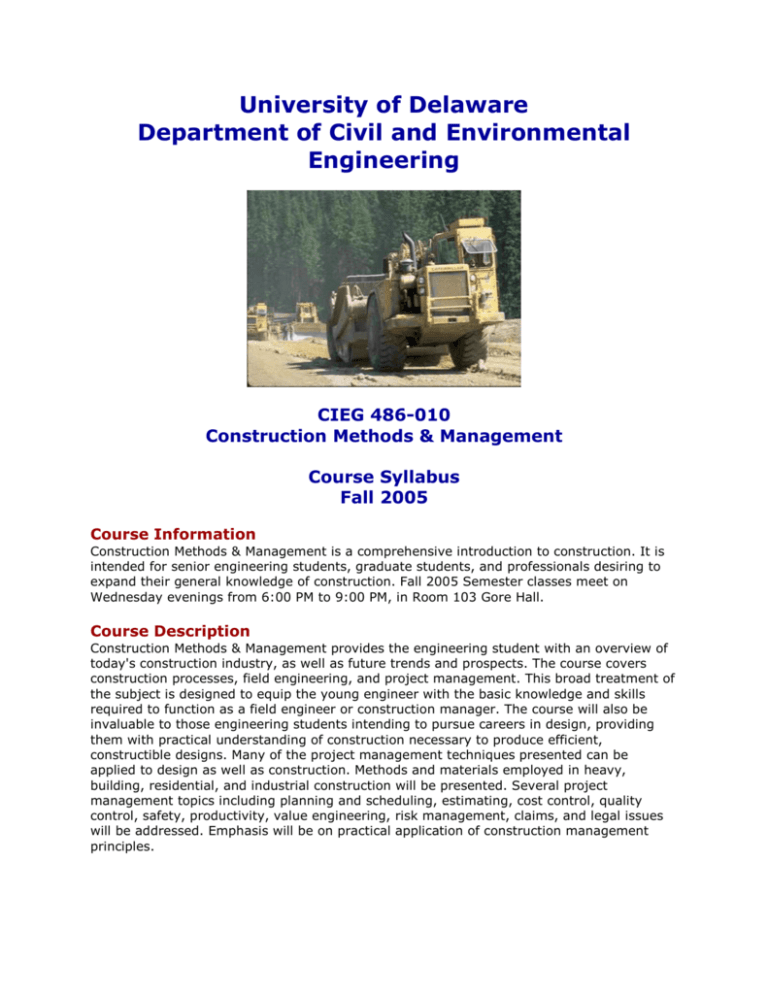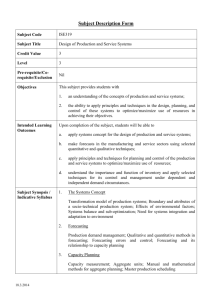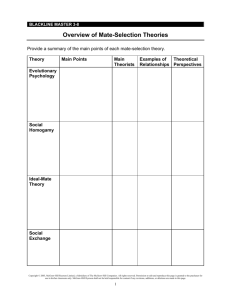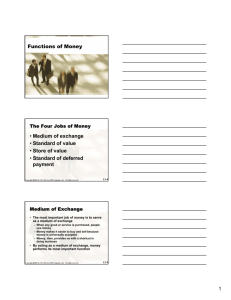
University of Delaware
Department of Civil and Environmental
Engineering
CIEG 486-010
Construction Methods & Management
Course Syllabus
Fall 2005
Course Information
Construction Methods & Management is a comprehensive introduction to construction. It is
intended for senior engineering students, graduate students, and professionals desiring to
expand their general knowledge of construction. Fall 2005 Semester classes meet on
Wednesday evenings from 6:00 PM to 9:00 PM, in Room 103 Gore Hall.
Course Description
Construction Methods & Management provides the engineering student with an overview of
today's construction industry, as well as future trends and prospects. The course covers
construction processes, field engineering, and project management. This broad treatment of
the subject is designed to equip the young engineer with the basic knowledge and skills
required to function as a field engineer or construction manager. The course will also be
invaluable to those engineering students intending to pursue careers in design, providing
them with practical understanding of construction necessary to produce efficient,
constructible designs. Many of the project management techniques presented can be
applied to design as well as construction. Methods and materials employed in heavy,
building, residential, and industrial construction will be presented. Several project
management topics including planning and scheduling, estimating, cost control, quality
control, safety, productivity, value engineering, risk management, claims, and legal issues
will be addressed. Emphasis will be on practical application of construction management
principles.
Course Objectives
To gain a general understanding of the construction industry, processes, and
organizational structures
To introduce the technically oriented individual to the business aspects of
construction
To develop the basic skills necessary to manage the construction process from
various perspectives
To understand job functions and roles of the various players in the construction
industry
To become familiar with the application of various construction equipment
To equip designers with knowledge of construction practices to better enable them to
produce safe, practical designs
To acquire basic estimating and cost control skills
To acquire fundamental scheduling skills
Use electronic spreadsheets and other software to manage construction operations
Learn how to compute, monitor, and modify production rates
Increase understanding of material behavior
To develop an appreciation and dedication to safety
To cultivate teamwork and communication skills
To kindle a sense of professionalism and encourage ethical practice
Course Policies and Requirements
All of the applicable academic policies, rules, and regulations established by the
University apply to this course. This information is readily found in the U of D
Student Guide to University Policies, which can be viewed online at
http://www.udel.edu/stuguide/05-06/index.html.
Attendance is required of all students. Three (3) unexcused absences will result in a
failing grade. Students will not be able to make up work, assignments, or tests
missed due to an unexcused absence. If a student cannot attend class, he or she
should make an effort to contact the instructor prior to that session, but certainly
before the next scheduled class. It is the student's responsibility to obtain and/or
schedule make up material from the instructor.
Assignments include required reading from the course text and supplemental
handouts, as well as written homework problems and team projects.
Course Evaluation and Grading
Learning assessment and grading will be through a combination of assignments, class
participation, and testing. Testing includes two or three quizzes, a midterm, and a final
exam. Homework will not be graded, but credit will be given for assignments completed on
time. Course requirements include team projects culminating with written reports and oral
presentations. The following tables show the relative contribution of each element to the
final grade, and the grade ranges.
Grading Structure
Class Participation
Written Assignments
Quizzes
10%
10%
15%
Midterm Exam
Final Exam
Team Projects
20%
20%
25%
Grade Ranges
Grade
Range
Grade Range Grade Range Grade Range
A
95-100
B
86-88
C
77-79
D
68-70
A-
92-94
B-
83-85
C-
74-76
D-
65-67
B+
89-91
C+
80-82
D+
71-73
F
<65
Instructor Information
Robert Muir, PE
Phone: (609) 617-1515
E-mail: rmuir@udel.edu
Over 30 years of progressive experience in engineering and construction, starting as
a draftsman and surveyor, then as field engineer, resident engineer, project
manager, and senior project manager. Currently serving as full-time faculty in the
Construction Management Program at Drexel University, Philadelphia, PA.
Construction management experience in all facets of heavy highway and industrial
construction
Experience representing both the owner and contractor
Bachelor of Science in Construction Management, Drexel University
Master of Science in Civil Engineering, Construction Engineering and Management,
Virginia Tech
Licensed Professional Engineer, State of Delaware
Course Text
Nunnally, S. W., Construction Methods and Management, 6th edition, Upper Saddle River,
NJ, Prentice-Hall, 2004, ISBN 0-13-048221-8.
Course References
A Guide to the Project Management Body of Knowledge (PMBOK® Guide), 3rd edition, Project
Management Institute (PMI), Newtown Square, PA, 2004.
Allen, Edward and Iano, Joseph, Fundamentals of Building Construction, 4th edition,
Hoboken, NJ, John Wiley & Sons, 2004.
Barrie, Donald S. and Boyd C. Paulson, Professional Construction Management: including
CM, Design-Construct, and General Contracting, 3rd edition, New York, McGraw-Hill, 1992.
Beall, Christine, Masonry Design and Detailing: For Architects, Engineers, and Contractors,
3rd edition, New York, McGraw-Hill, 1997.
Bockrath, Joseph T., Dunham and Young's Contracts, Specifications, and Law for Engineers,
4th edition, New York, McGraw-Hill, 1986.
Brown, Robert Wade, Practical Foundation Engineering Handbook, New York, McGraw-Hill,
1996.
CE News published monthly by Mercor Media, Inc., Alpharetta, GA., Sharon M. Fauerbach,
PE, Editor.
Clough, Richard H., Construction Contracting, New York, John Wiley & Sons, 1986.
Collins, Jim, Good to Great, New York, HarperCollins, 2001.
Dell 'Isola, Alphonse J., Value Engineering in the Construction Industry, Washington, D.C.,
Smith, Hinchman, and Grylls, 1988.
Dell’Isola, Alphonse, Value Engineering: Practical Applications for Design, Construction, &
Maintenance Operations, Kingston, MA, RS Means Company, 1997.
ENR (Engineering News Record) published weekly by McGraw-Hill, New York, Janice Lyn
Tuchman, Editor-in-Chief.
Hendrickson, Chris and Tung Au, Project Management for Construction, Englewood Cliffs,
New Jersey, Prentice-Hall, 1989.
Hinze, Jimmie W., Construction Planning and Scheduling, 2nd edition, Upper Saddle River,
NJ, 2004.
Huth, Mark W., Understanding Construction Drawings, 4th edition, Clinton Park, NY,
Thomson Delmar Learning, 2005.
Kerzner, Harold, Applied Project Management: Best Practices on Implementation, New York,
John Wiley & Sons, Inc., 2000
Liu, Cheng and Jack B. Evett, Soils and Foundations, 4th edition, Upper Saddle River, New
Jersey, Prentice-Hall, 1998.
Manual of Steel Construction, Allowable Stress Design, 9th edition, American Institute of
Steel Construction, New York.
Manual on Design and Construction of Driven Pile Foundations, Federal Highway
Administration, Washington, D.C., 1986.
Marchman, David A., Construction Scheduling with Primavera Project Planner, Albany, New
York, Delmar Publishers, 1998.
McCormac, Jack, Design of Reinforced Concrete, 3rd edition, New York, HarperCollins
College Publishers, 1993.
Merritt, Frederick S., Standard Handbook for Civil Engineers, 3rd edition, New York,
McGraw-Hill, 1983.
Michalski, Walter J., 40 Tools for Cross-Functional Teams: Building Synergy for
Breakthrough Creativity, New York, Productivity Press, 1998.
Modor, Joseph J. and Phillips, Cecil R., Project Management with CPM and PERT, New York,
Van Nostrand Reinhold Co., 1970.
Newnan, Donald G., Engineering Economic Analysis, 4th edition, Sa Jose, California,
Engineering Press, 1991.
O'Brien, James J. and Robert G. Zilly, Contractor's Management Handbook, 2nd edition,
New York, McGraw-Hill, 1991.
O'Brien, James J., John A. Havers, and Frank W. Stubbs Jr., Standard Handbook of Heavy
Construction, 3rd edition, New York, McGraw-Hill, 1996.
O’Brien, James J. and Plotnick, Fredric L., CPM in Construction Management, 5th edition,
Boston, MA, McGraw-Hill, 1999.
OSHA 10-Hour Construction Training Program, The PMA Insurance Group, 2001.
Olin, Harold B., John L. Schmidt, Walter H. Lewis, revised by H. Leslie Simmons,
Construction: Principles, Materials, and Methods, 6th edition, New York, Van Nostrand
Reinhold, 1995.
Patrick, Charles, Construction Project Planning and Scheduling, Upper Saddle River, NJ,
Pearson Prentice Hall, 2004.
Paulson, Boyd C., Computer Applications in Construction, New York, McGraw-Hill, 1995.
Peurifoy, Robert L., Schexnayder, Clifford J., and Shapira, Aviad, Construction Planning,
Equipment, and Methods, 7th edition, New York, McGraw-Hill, 2006
Primavera Project Planner (P3)®, Planning and Control Guide, version 3.0, Primavera
Systems, Inc., Bala Cynwyd, PA, 1999.
Riggs, James L., Production Systems: Planning, Analysis, and Control, 2nd edition, Santa
Barbara, John Wiley & Sons, Inc., 1976.
Ross, Steven S., Construction Disasters: Design Failures, Causes, and Prevention, New
York, McGraw-Hill, 1984.
Royer, King, Desk Book for Construction Superintendents, 2nd edition, Englewood Cliffs,
New Jersey, Prentice-Hall, 1980.
Watson, Don A., Construction Materials and Processes, New York, McGraw-Hill, 1972.
Department of Civil and Environmental Engineering
Construction Methods & Management
CIEG 486-010
Course Schedule -- Fall 2005
Required
Reading
Week
Date
Topic
Class Notes
1
31-Aug-05
Construction Industry/Construction Organizations
2
7-Sep-05
Contracts/Specifications/Claims
Chaps. 1, 2, and "Challenges..."
Intro to Construction 2
3
14-Sep-05
Earthwork/Heavy Equipment
Chaps. 3, 4, 5, & 7
Earthwork Notes
4
21-Sep-05
Cranes/Utility Construction
Chaps. 8, 9, 10, & 17
Crane Notes
5
28-Sep-05
Materials/Paving/Bridges
Chaps 15 & 16
Concrete/Paving/Bridge
6
5-Oct-05
Foundations/Piles/Marine Construction
Chapter 19 and "Piles" Doc.
Foundation Notes
7
12-Oct-05
Building Types & Components
Chapter 21
Building Notes
8
19-Oct-05
Intro to Project Mgt./Planning & Scheduling
"Teamwork" paper
Scheduling Notes
9
26-Oct-05
Planning & Scheduling
Scheduling Notes
10
2-Nov-05
Estimating and Cost Control
Estimating Notes
11
9-Nov-05
Construction Safety/Risk Management
12
16-Nov-05
QC/QA and Value Engineering
13
23-Nov-05
Thanksgiving Recess -- No Class
14
30-Nov-05
Project Presentations
Teams 1, 3, 5, 7, 9, & 11
15
7-Dec-05
Project Presentations
Teams 2, 4, 6, 8, 10
Intro to Construction 1
Trench Safety and Safety Handbook
Safety and Risk Mgt. Notes
QC/QA and VE Notes









